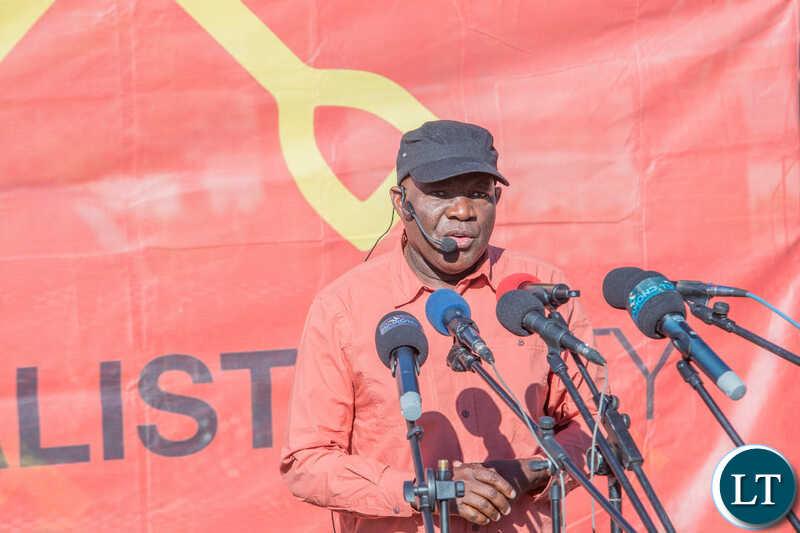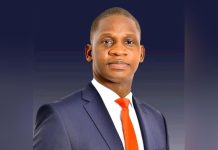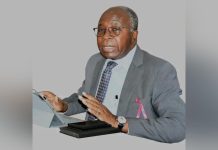Africa-Press – Zambia. Socialist Party Presidential candidate Fred M’membe has said that it will be suicidal for Zambians to vote back President Edgar Lungu and the ruling Patriotic Front (PF).
In a statement to the media, Dr M’membe said that a vote for President Lungu and the PF will be a vote to finish off whatever little life still remains in Zambia because the economic trajectory of the country started going down as soon as President Lungu took the reign of power
“A few months before the PF came to power in 2011 Zambia was reclassified as a lower-middle-income country. For the first three years of the PF’s reign under Mr Michael Sata, they managed to maintain the same economic growth trajectory. However, economic growth, which averaged 6.4 percent at the time, immediately started a downward spiral when Mr. Lungu took over the presidency.
“From a growth of 7.6 per cent in 2014, for instance, economic growth plummeted to 2.9 per cent in 2015. And has since been a deteriorating year in year out, reaching to 1.4 per cent in 2019 and negative 4.2 percent last year,” Dr Membe said.
On the fiscal side, De M’membe said the president Lungu and his government threw away fiscal prudence and replaced it with reckless borrowing, done in the name of infrastructure development when it is well known that the ulterior motive has been to create expenditure lines for corruption.
“As a result, we see a fiscal deficit, which basically is borrowing to finance the budget, increasing from an average of 2.5 per cent of GDP per annum when the PF took over to an average of 5.4 percent of GDP per annum under Mr Sata’s reign, to 11.7 per cent last years under Mr Lungu’s PF government.
“The idea of massive infrastructure development was right in and of itself but was not well thought out from the very beginning. It was irrational. The World Bank and the IMF, among many others, advised them to rationalise their infrastructure development expenditure but they were not ready to listen, ” he said.
Dr. M’membe said that there was need for equitable distribution of projects coupled with prudent fiscal consolidation so that every province of Zambia can benefit and the country only spends money that it has.
Dr. M’membe further said that the PF government went into high gear of borrowing for projects that only benefited a few areas at a very expensive cost.
“For example, statistics from the Ministry of Finance show that by end of this year – 2021 – debt service costs will have increased to US $3.3 billion which is equivalent to over ZMW 70 billion at the current exchange rate of K22/US$. So if your domestic resource mobilisation capacity is at K65 billion then you factor in K27 billion for salaries, K4 billion for grant aided institutions and K7 billion for government operations you have a budget deficit of K43 billion.
“When Zambia was classified as a middle-lower income economy, we went to what is called frontier market to borrow money to bridge our financing gap as a country as opposed to the traditional Paris Club members. While some of our debt to China is bilateral, most of it is either quasi-government or commercial. This has very serious consequences,” Dr M’membe said.
Dr. M’membe said that the high dent has made Zambia become a Highly Indebted Poor Country again and that excessive borrowing has increased Zambia’s public debt from 20.8 percent of GDP when the PF took over government in 2011 to more than 100 per cent in 2021, basically put Zambia on the world map for the wrong reason, being the first country to default on its debt service post COVID 19.
Dr M’membe said that the high debt has resulted in higher costs of debt service which the PF government, unfortunately, has now failed to manage adding that, for the first time, the country has defaulted on its debt service obligations, and that Zambia’s sovereignty is at risk because no one knows under what conditions the commercial Chinese debt was contracted.
“This is certainly not a recipe for the revival of our country’s economic fortunes. It’s also not a recipe for governing well,” he concluded.







